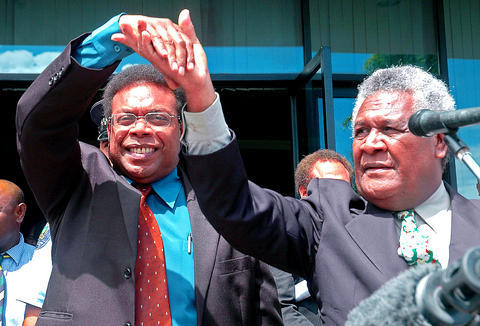Former education minister Derek Sikua was elected prime minister of the Solomon Islands yesterday, and immediately moved to repair ties with regional powers that became strained under his ousted predecessor
Sikua pledged yesterday to soothe ties with Canberra by sending controversial Attorney-General Julian Moti back to Australia to face child sex charges.
He had beem elected by legislators earlier in the day under tight security following last week's ousting of controversial leader Manasseh Sogavare.

PHOTO: AFP
Sikua, who was a leading critic of combative former leader Manasseh Sogavare, defeated Deputy Prime Minister and Foreign Minister Patteson Oti in the vote, said Deli Oso, a spokeswoman for the prime minister's office.
The new leader, who led a defection by a dozen government lawmakers last month, won by 32 votes to 15 in the ballot among 47 lawmakers. One legislator in the 48-member house is dead and his seat remains unfilled.
Sogavare was ousted in a no-confidence vote last week, following the defection of nine ministers -- including Sikua -- who had become increasingly disillusioned over the prime minister's handling of the relationship with Australia and other regional neighbors.
Sogavare was embroiled in a bitter stand-off with Australia after the appointment last year of his friend Julian Moti, who Canberra wants to extradite over child sex charges dating back to 1997.
Sikua said his Cabinet would make a formal decision on how Moti would be sent back to Australia when it meets this weekend.
"Moti is an Australian citizen, he will be sent back to Australia," he told a press conference. "The new immigration minister needs to be in place to sign the instruments."
A tight security cordon surrounded the parliament during the vote, with a police helicopter circling overhead and troops guarding the road up to the building on a hill overlooking the capital.
Police guarded the parliament and kept the public out of the immediate area, but there was no sign of trouble during the day.
Security forces belonging to the Regional Assistance Mission to Solomon Islands (RAMSI) and local police were accused of negligence in failing to prevent rioting after a similar election in April last year.
The unpopular Snyder Rini was elected as prime minister but resigned less than a week later to be replaced by Sogavare, who regularly accused Australia of bullying during his 19-month term. Sogavare had been trying to reduce Australia's dominant role in RAMSI.
But Sikua said he wanted to visit Canberra early in the new year and would improve relations with RAMSI.
Sikua's election was welcomed by Australian Foreign Affairs Minister Stephen Smith.
"Australia is committed to assisting the Solomon Islands, through RAMSI and our bilateral aid program, to build a prosperous and sustainable future," Smith said.

The military is to begin conscripting civilians next year, Cambodian Prime Minister Hun Manet said yesterday, citing rising tensions with Thailand as the reason for activating a long-dormant mandatory enlistment law. The Cambodian parliament in 2006 approved a law that would require all Cambodians aged 18 to 30 to serve in the military for 18 months, although it has never been enforced. Relations with Thailand have been tense since May, when a long-standing territorial dispute boiled over into cross-border clashes, killing one Cambodian soldier. “This episode of confrontation is a lesson for us and is an opportunity for us to review, assess and

The United States Federal Communications Commission said on Wednesday it plans to adopt rules to bar companies from connecting undersea submarine communication cables to the US that include Chinese technology or equipment. “We have seen submarine cable infrastructure threatened in recent years by foreign adversaries, like China,” FCC Chair Brendan Carr said in a statement. “We are therefore taking action here to guard our submarine cables against foreign adversary ownership, and access as well as cyber and physical threats.” The United States has for years expressed concerns about China’s role in handling network traffic and the potential for espionage. The U.S. has

IDENTITY: A sex extortion scandal involving Thai monks has deeply shaken public trust in the clergy, with 11 monks implicated in financial misconduct Reverence for the saffron-robed Buddhist monkhood is deeply woven into Thai society, but a sex extortion scandal has besmirched the clergy and left the devout questioning their faith. Thai police this week arrested a woman accused of bedding at least 11 monks in breach of their vows of celibacy, before blackmailing them with thousands of secretly taken photos of their trysts. The monks are said to have paid nearly US$12 million, funneled out of their monasteries, funded by donations from laypeople hoping to increase their merit and prospects for reincarnation. The scandal provoked outrage over hypocrisy in the monkhood, concern that their status

A disillusioned Japanese electorate feeling the economic pinch goes to the polls today, as a right-wing party promoting a “Japanese first” agenda gains popularity, with fears over foreigners becoming a major election issue. Birthed on YouTube during the COVID-19 pandemic, spreading conspiracy theories about vaccinations and a cabal of global elites, the Sanseito Party has widened its appeal ahead of today’s upper house vote — railing against immigration and dragging rhetoric that was once confined to Japan’s political fringes into the mainstream. Polls show the party might only secure 10 to 15 of the 125 seats up for grabs, but it is